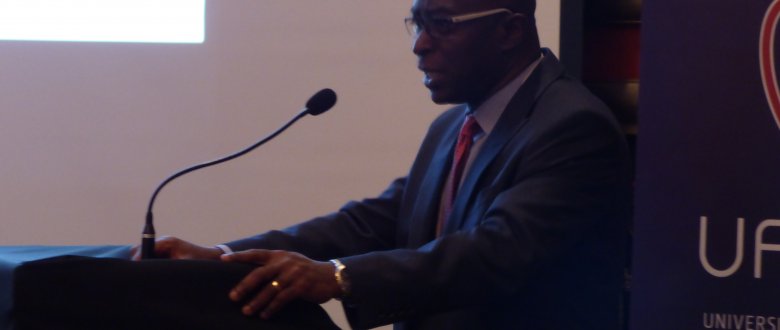
The University of the Free State (UFS) and the Central University of Technology (CUT), joined forces with the Flemish Association for Development, Cooperation and Technical Assistance (VVOB), to organise an international Symposium on Teacher Education for Inclusive Teaching (July 2-4, 2019), sponsored by the European Union. This year’s edition was all about ‘Shifting towards inclusive mindsets: Achieving meaningful participation for all’. From all over South Africa 150 educators, education officials and experts made their way to Vanderbijlpark. Special guest and key-note speaker, Prof. Kwame Akyeampong, Professor of International Education and Development at the Centre for International Education, University of Sussex, came all the way from the United Kingdom. He spoke about Reconstructing teacher education towards the production of teachers as agents of inclusive practice. VVOB asked him about his views on teacher education, how teachers play a critical role as agents of inclusive practice, and more.
What is inclusive practice, according to you?
I think inclusive practice is basically the recognition that we have different learners who have different learning needs, and who come from different backgrounds. And therefore, it is important that - in relating to these learners - we are very much aware of this background. That we engage with them in a way which recognises their differences, but also invites them to be actively involved in the learning process. I think, traditionally, teachers have often been trained to think of their practice in relation to an ideal student, which is often projected by the school curriculum. Inclusive practice recognises that learners are different, and therefore require different approaches.
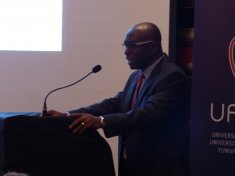
Why is inclusive practice so important, according to you?
In today’s world we are faced with so many different challenges and in many societies, we can see that the gap between the advantaged and the disadvantaged is widening. We have a lot of initiatives trying to close that gap, but I think, unless we take the issues around inclusiveness seriously, I’m afraid this gap will be difficult to close. The reason why this learning gap persists is often because our teachers’ practices serve the interest of the advantaged much more than the disadvantaged.
“And I think, if we don’t address this learning gap,
we are going to create a world or a society in which we are more likely to see conflict,
as those who have been left behind feel aggrieved.”
In my opinion, many education systems haven’t recognised that much of what we do has not served the interest of the very wide range of people who have different learning needs.
How do you see teachers playing a critical role as agents of inclusive practice?
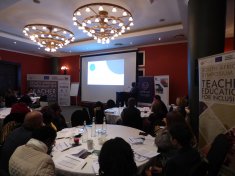
I think that the first time when some children feel the effects of exclusion, is in the classroom. And either what teachers do, or what schools do, reinforces this exclusion. So, teachers then become very important in how we either reproduce exclusion or create more inclusion. I think the classroom is the place where teachers can give value to diversity and show that children from different backgrounds, with different experiences actually can contribute to the learning space and to society. Teachers can also send a big signal to children, as they progress in their education, that diversity is actually a strength to create more inclusive societies. So, teachers, really, to me, are quite pivotal in how we create a future where we embrace diversity and use it for the good of society.
Why do you think teacher education needs to be reconstructed?
I think that, unfortunately, teacher education, particularly in Sub-Saharan Africa, has not sufficiently recognised the needs of different learners and how we can develop pedagogies that can maximise the learning potential of every child. There isn’t a one size fits all pedagogy out there. The gap between the advantaged and the disadvantaged in learning has widened so much and teachers, particularly in the global South, haven’t been trained to recognise the problem and are not equipped to address it. Teachers must recognise that many of the children who are being left behind, are being left behind precisely because the education system or schools fail to address their learning needs.
“A lot of children do go to school, for example.
They are in the classroom, but could be described as silently excluded,
because the teachers’ pedagogies are not beneficial to their learning.”
I think that unless we begin to take seriously the issues around inclusive practice, that gap, unfortunately, would remain for a long time. And the way to really address this is, is to make teachers much more aware of the gap, but also to equip them to be able to address it. I think reconstruction is really about how we structure the training process. We should give more opportunities for beginning teachers to have early access to schools and practices on the ground to appreciate the needs of different learners. But
“reconstruction is also about how we invite
Professional Learning Communities to be part of the process of training teachers,
and to make their knowledge accessible to beginning teachers.”
Reconstruction of teacher education, to me, is about opening up space for this knowledge to be part of the process of learning to teach. And I think if we do this, we’d be making our prospective teachers better prepared to be agents of change.
How do you see teacher education creating these agents of change?
We need to look at how we can use technology in ways in which we can bring different teacher communities together. This will allow teachers in different areas to access successful practices of other teachers and can learn from that. I think that these platforms are there, and we need to maximise their use. I don’t think we are doing that sufficiently. There are challenges with connectivity when it comes to using communicative technologies to share teachers’ knowledge and experiences, but there are solutions to this we need to look at.
According to you, who should take ownership in reconstructing teacher education towards the production of teachers as agents of inclusive practice?
That’s a good question, and a very important question also. I think it is a responsibility of both governments and ministries, and teacher educators. I think that, first and foremost, we need to engage with policy makers. I think, for government and ministries, the big challenge is money [funding]. If we the professionals and researchers can demonstrate to them that on can actually achieve more in terms of improving teacher quality for less, I think they will pay more attention.
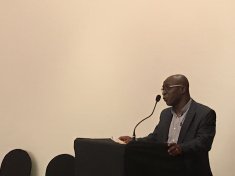
I will give an example about Ghana. We have a system where we’ve extended teacher education from 3 to 4 years and we have made it a degree qualification, which I think is moving in the right direction. Teachers in Ghana now have to have a degree to be able to teach. But the politicians and policy makers still think about effectiveness in terms of duration, in terms of doing more of the same for longer. I think we need to engage with them and say that you can do less and get more for your money. Why can’t we have 2 or 3 years, but interspersed with more time in school practice?
“But the change also has to come from teacher educators.”
In some of my own work, I see that the challenge is changing the mindset of teacher educators. It really is difficult. Teacher educators have themselves been socialised into their own profession through a model of learning to teach which is very different from what inclusive practices developed from actual classrooms. Convincing them to do things differently, is very difficult. I think we need to look at teacher educators and see how we can begin to engage them in ways which can make them rethink their own approach to training teachers. From my own experience, it’s important we engage them in researching inclusive practice – helping them to rethink through the evidence what works and what doesn’t work. If we are training teachers and they are not making a difference in the classroom, in terms of learning outcomes, we have to go back and ask the teacher educators what they think is happening and how they can be agents to rectify this.
How can they make sure teachers, new and experienced (pre- and in-service), are equipped with the tools to be(com)ing these agents of change?
Learning to teach is a life-long professional process, and if that is what we believe, then learning to become a teacher also has to reflect that. It has to reflect the importance of experienced teachers and that their knowledge is as important as the knowledge that we present to new teachers in their training classroom.
“Teaching is a hard job. We can inspire teachers through our pre-service training with these new ideas about inclusiveness, but if we don’t support them when they are making that transition, very early on to get them to understand what teaching in the real world is, they can become very disillusioned and all of that inspiration would be lost.”
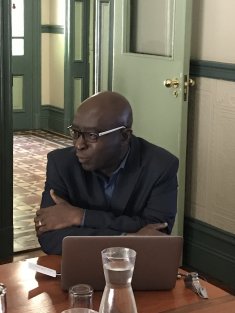
This is where we haven’t done enough. When teachers make that transition into formal teaching, we withdraw support. To be an agent of change, you do need to have this reinforcement of support and I don’t think we do enough post-training to connect teachers with effective teaching communities but also to provide support. We front-load a lot of our teacher education into the pre-service when we actually know that the real change that occurs is in the period when they are in schools learning to practice their craft. If we believe that learning to teach is a life-long process, then a lot of effort has to go into supporting teachers, particularly in the early years. If we don’t get teachers to really think as agents of change and actually practice that in the early years when they become teachers, they can be rather overwhelmed by circumstances and difficulties in the classroom, whatever we’ve tried to do with them, will be lost.
“It’s a question of bringing the real world of the classroom into the college.”
We often look at teacher education using models that do not embrace what is working on the ground. And I think we can close the gap rapidly if we can tap into practices that are successful. We identify these practices; we learn from successful practices and mainstream these practices in our teacher education programmes.
Some research has shown that actually when you talk about expertise, and effective practice, beyond a certain period of time, teachers don’t actually improve anymore. And the way in which you get teachers to improve, is getting them to work collectively, and giving them support.
So, learning to teach is not only something we do in the pre-service system. In-service teachers pick up a lot of insights in teaching. Learning to teach has to engage with real practice. It isn’t theory first, and then practice, it’s theory and practice together. Why can’t we bring experienced teachers into the colleges?
“I think we really need to disrupt the hierarchies of knowledge that we have
in many of our systems in Africa, if we want dynamic teachers
who are going to make a big difference.”
What is the most significant impact you believe teachers as agents of inclusive practice can have?
I think they will be contributing to a more sustainable future for young people. An inclusive education system where teachers are the drivers and the movers of inclusiveness, can actually create help a maximise a countries human resource. For me, real development is about inclusiveness. If you have development where segments of societies are making much more progress than others, you are leaving a lot of people behind. That’s not development. As you develop, you close the gap - that’s development. Teachers as agents of inclusive practice are really key to national development because they are helping to tap into the potential that exists in every child, maximising each childs’ opportunity to learn, so that society can take advantage of the diverse pool of human resources, of knowledge and expertise for development to take place.




